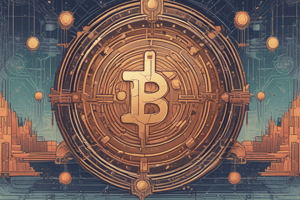Podcast
Questions and Answers
Speaker grew up in Pakistan in the 90s and first experienced the internet with ______ browser, becoming infatuated with it.
Speaker grew up in Pakistan in the 90s and first experienced the internet with ______ browser, becoming infatuated with it.
Netscape
Dedicated life to understanding how the internet functions, earning a PhD in ______ Science.
Dedicated life to understanding how the internet functions, earning a PhD in ______ Science.
Computer
Internet usage involves ______ and companies, including browser software creators, internet service providers, and certificate issuers.
Internet usage involves ______ and companies, including browser software creators, internet service providers, and certificate issuers.
middlemen
These companies can issue incorrect security certificates, leading to users thinking they're accessing the correct websites when they ______.
These companies can issue incorrect security certificates, leading to users thinking they're accessing the correct websites when they ______.
Users don't own their data on the internet; it's controlled by big companies like Google and ______.
Users don't own their data on the internet; it's controlled by big companies like Google and ______.
Speaker proposes two requirements for a better internet: no ______ and user ownership of data.
Speaker proposes two requirements for a better internet: no ______ and user ownership of data.
Introduces blockchain technology as a solution, allowing users to own digital money and securely send transactions ______ to others.
Introduces blockchain technology as a solution, allowing users to own digital money and securely send transactions ______ to others.
Blockchain uses a private ______, a highly secure password-like code, for protection.
Blockchain uses a private ______, a highly secure password-like code, for protection.
Bitcoin, the first application of blockchain technology, aimed to replace banks and payment processors with an open network secured by mathematics and ______.
Bitcoin, the first application of blockchain technology, aimed to replace banks and payment processors with an open network secured by mathematics and ______.
The new internet eliminates the need for passwords, replacing them with secure ______.
The new internet eliminates the need for passwords, replacing them with secure ______.
Flashcards are hidden until you start studying
Study Notes
- Speaker grew up in Pakistan in the 90s and first experienced the internet with Netscape browser, becoming infatuated with it.
- Dedicated life to understanding how the internet functions, earning a PhD in Computer Science.
- Internet usage involves middlemen and companies, including browser software creators, internet service providers, and certificate issuers.
- These companies can issue incorrect security certificates, leading to users thinking they're accessing the correct websites when they aren't.
- Users don't own their data on the internet; it's controlled by big companies like Google and Facebook.
- Speaker proposes two requirements for a better internet: no middlemen and user ownership of data.
- Introduces blockchain technology as a solution, allowing users to own digital money and securely send transactions directly to others.
- Blockchain uses a private key, a highly secure password-like code, for protection.
- Bitcoin, the first application of blockchain technology, aimed to replace banks and payment processors with an open network secured by mathematics and cryptography.
- Blockchain browsers, such as Blockstack, create a parallel, more secure internet where users own and control their data and usernames.
- The new internet eliminates the need for passwords, replacing them with secure usernames.
- Concept of property rights exists in the real world but not online, with users renting from big companies.
- New internet introduces ownership, allowing users to own and control their usernames and data.
- Power dynamics shift from large companies to individuals with the new internet.
Studying That Suits You
Use AI to generate personalized quizzes and flashcards to suit your learning preferences.




